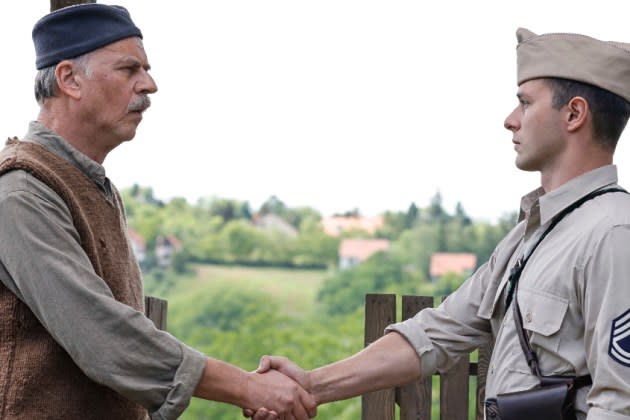Controversial Serbian World War II Drama Sparks Outrage at Sarajevo Film Festival, as Mayor Calls for Resignations and Fest Fights Back

A World War II drama that critics say glorifies Serbian nationalist groups has sparked outrage at the Sarajevo Film Festival, with organizers under fire for allowing excerpts of the forthcoming film to screen and the mayor of Sarajevo demanding resignations in the ensuing dust-up.
On Wednesday, the Sarajevo fest fought back, insisting that it was caught off-guard by the film’s inclusion at an industry event on Tuesday.
More from Variety
'Animal' Review: A Poignant Portrait of Life Amid the Sequins and the Seediness of a Greek Resort
Sarajevo Film Festival Cancels Screenings, Events on Bosnia's 'Day of Mourning' Following Murders
“Heroes of Halyard,” from Serbian actor and director Rados Bajic, is set in a remote Serbian village in the spring of 1944 and tells the story of a family torn apart by competing ideologies when two brothers take up opposing sides in the dying days of World War II: one fighting on behalf of the right-wing Yugoslav Army in the Homeland, the other on behalf of the left-wing Partisans. It centers on the true story of a rescue operation to save American and Allied airmen trapped behind enemy lines in Nazi-occupied territory of what is now Serbia.
The film, which is produced by Telekom Srbija in cooperation with Serbia’s Contrast Studios, is being billed as “a paradigm of the Serbian national tragedy, wars of brother against brother and ideological splits, leading an entire nation to a pitfall.”
Clips from the work-in-progress were presented on Tuesday during a content showcase from Serbia’s state-backed telecom giant and immediately sparked an outcry among Bosnians in attendance. The Yugoslav Army in the Homeland, often referred to as Chetniks, was initially formed to resist the invasion of Yugoslavia by Axis forces during WWII, but occasionally collaborated with Nazi Germany and Fascist Italy while fighting against communist Partisans. The group was responsible for ethnic massacres and other war crimes. During the war in Bosnia in the 1990s, Serb forces who identified with the Chetnik movement also committed atrocities.
Amid a firestorm on social media and in the local press in Bosnia, where memories of that brutal war run deep, Sarajevo mayor Benjamina Karić demanded “concrete responsibility” on the part of the festival, insisting that “such attacks cause immeasurable damage to the festival and to the city of Sarajevo,” according to local news outlet Sarajevo Times.
She also called for the removal of those responsible for including the film in Tuesday’s showcase, setting that as a condition for continued cooperation between the city and the festival.
On Wednesday, the Sarajevo fest issued a statement insisting the content of the incendiary film was misrepresented by Telekom Srbija and accusing the company of breaching the venerable Bosnian fest’s trust.
“Up until now, we have communicated with all partners in professional trust regarding the material they would present. The content of this project was never mentioned. It is evident that this…revisionist content has breached that trust,” read the statement.
A rep for Telekom Srbija, meanwhile, told Variety the company was “surprised by the reaction of the festival organizer,” insisting the company — which was presenting a showcase in Sarajevo for the third consecutive year — abided by the standard procedures and “announced…all projects and participants in panels with associated trailers” ahead of Tuesday’s industry event.
Festival organizers nevertheless insisted they “accept responsibility for this inappropriate content and understand the negative comments from the public,” adding that, moving forward, similar showcases presented during the festival would be subjected to a rigorous vetting process from the programming team.
The controversy comes on a nationwide day of mourning in Bosnia, following three murders committed in the northeastern town of Gradačac last week.
On Wednesday, the festival canceled all its screenings and public events, apart from a panel titled “Femicide in Film, Television and New Media,” which discussed the artistic and media representations of violence against women.
The festival had previously said it would cancel social events but continue with screenings, workshops, lectures and presentations on Wednesday, but it subsequently shut down its activities almost entirely.
UPDATED: This story was updated with additional context about the role of the Chetniks during World War II.
Best of Variety
Sign up for Variety’s Newsletter. For the latest news, follow us on Facebook, Twitter, and Instagram.
